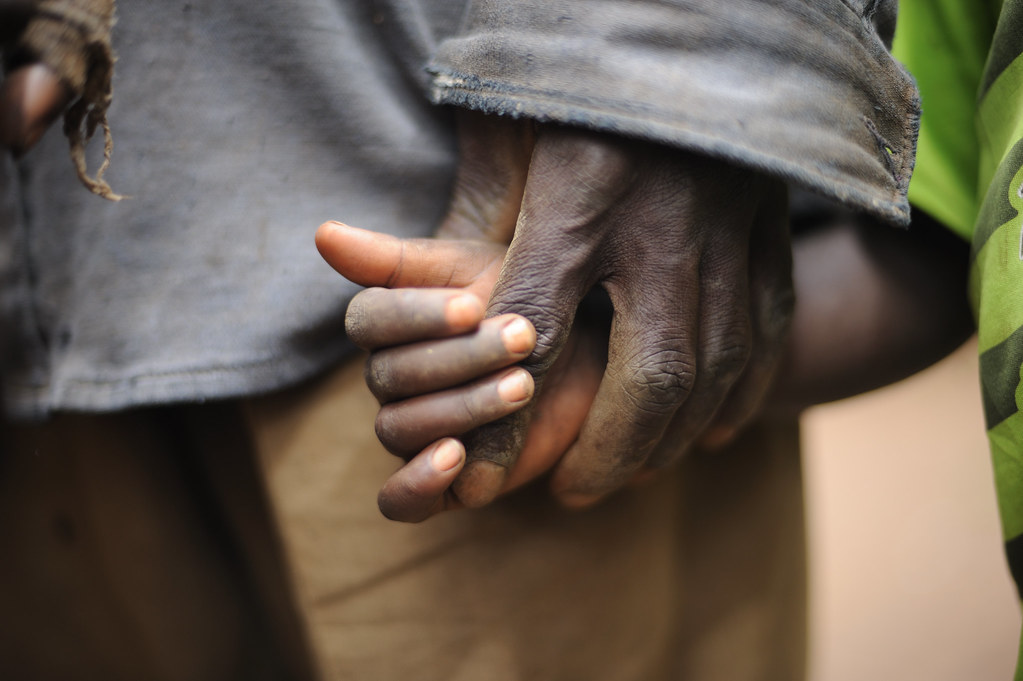Photo of child holding father’s hand by Julien Harneis via Flickr.
Fourth Sunday of Lent
Marj Humphrey
March 30, 2025
Jos 5:9a, 10-12 | 2 Cor 5:17-21 | Lk 15:1-3, 11-32
The Parable of the Prodigal Son, this Sunday’s gospel reading, is a story so familiar that it is easy to feel immune to both the breadth and depth of its message. It is the story of three people, a father and his two sons, and the actions and reactions of each of them in an important moment.
The youngest son is the “prodigal” son. This son takes his inheritance and goes off to “foreign lands” and squanders it all on excesses with selfish abandon. The heart of the story comes when the son – now broke, alone, suffering, and ashamed – returns home to beg for his father’s forgiveness, while acknowledging his unworthiness to receive such forgiveness.
In an extraordinary action, the father sees his son from afar and runs out to meet him. The son doesn’t have a chance to confess and beg forgiveness before the father embraces him with great joy and emotion.
The third person in the parable is the older son, who has worked faithfully throughout his life and returns at the end of the day to find his father receiving his wayward brother not just as an equal son, but almost as royalty. The father has “killed the fatted calf” to celebrate. The older brother is full of anger and jealousy, complaining vehemently that their father never so much as killed a goat for him.
Time spent as a Maryknoll Lay Missioner in different cultures has helped me to see that we have much to learn from people who live a cultural tradition, a theology, a view of reality that is different than our own.
Sometimes I wonder if our U.S. culture is “prodigal.” When will we see our country’s excesses compared to most of the rest of the world? When will we finally feel the “pinch” and see that we are squandering what has so generously been given to us?
When will we recognize that we are over-consuming natural resources while younger generations and other parts of the world beg us to stop? When will we realize the effects our way of life on the rest of the world? How will we acknowledge what we have done and ask for forgiveness?
When will our eyes open to that part of us that is the older son, who has received so much, thanks to a generous and loving parent? The Father invites us to share in the joy of knowing that those who are in need are welcome to the fullness of life unconditionally.
The gospel story shouts of reconciliation. The father desires for his family to be reconciled. Rather than dwell on wrongdoings, he helps each brother understand that they are loved equally in his eyes and worthy of all he has.
Our country is deeply and bitterly divided. Having served in East Africa for many years as a Maryknoll Lay Missioner, I find hope in the incredible acts of forgiveness as well as “embrace of the other” that I witnessed there. I remember the powerful, nonviolent attempts at “Truth and Reconciliation” by South Africans, regardless of race and atrocities perpetrated against them. I remember the Rwandan Genocide, which occurred while I was serving in nearby Sudan, and the remarkable stories of Rwandese of both ethnic tribes who chose the path of reconciliation when dealing with the horrendous acts done against them.
Although some would dispute the effectiveness of the Truth and Reconciliation methods, the profound truth embedded in these gestures continues to teach us.
The father in the Parable of the Prodigal Son is alive and well in our brothers and sisters of all races, genders, nationalities, and sexual orientation who, day to day, teach us how to forgive and reconcile. As important as personal forgiveness is, our society cries out for a larger embrace.

